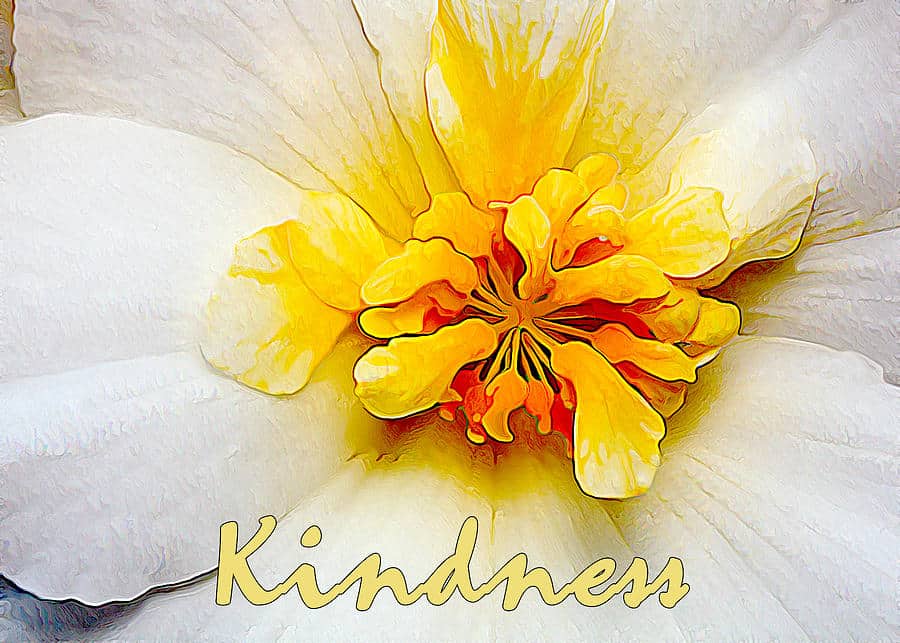When my daughters were young and having a typical sibling squabble, in desperation I would often ask them ‘are you being kind?’. It was an attempt to avoid becoming involved in their argument and to get them to think about what was really important at that moment. Amazingly, it usually worked.
Lately, I have had to remind myself of this tactic as I try to bring more kindness and compassion into my thinking.
Kindness or being kind is a trait that most parents try to develop in their children and for good reason. We are social beings and we need to get on with others, so how we behave towards our fellow humans is important.
It seems strange then that the natural tendency toward kindness and compassion that we see in children is not always evident in our behaviour as adults. The current pandemic has demonstrated this and, while we have been applauding health and social care workers and volunteers who have been tireless in their selflessness, others have not behaved in such altruistic ways.
Early in the pandemic, it was hard not to judge people fighting over toilet paper and emptying supermarket shelves as they filled their trollies and refused to share. More recently, there has been criticism of people unwilling to wear masks or keep their social distance when out in public.
As I get older, anger seems to be such a waste of energy because it is always about things over which I have limited control anyway. Also, we are beginning to realise how damaging being angry is to our general health and wellbeing. So, there is some personal benefit in taking a pause when other people’s behaviour seems unreasonable and, in pausing, save ourselves some unnecessary stress.
My first reaction on seeing these things in the media (presently I am still shielding with my husband) is to feel angry and I find myself having to pause. In particular, when I see images of groups of people behaving in any way that I find unacceptable, I find it difficult to avoid labelling and stereotyping the behaviour.
Biases become apparent in the way events are interpreted and described in the media and on social platforms. As humans, we all tend to look for evidence that confirms the ideas and beliefs we already hold. It is human nature and part of our natural sociability to identify with others who are like us or seem to share common ideas and values.
This becomes a problem if we just follow along without looking at the whole picture and being careful of where our impressions lead us.
In the UK there has been much talk about divisions in society, particularly since the EU referendum, because the outcome of ‘yes or no’ decisions suggests there are directly and completely opposed opinions.
A recent report, from The Policy Institute at King’s College London on polarisation and fragmentation trends in the UK, defines two key terms: ‘issue polarisation’ when divisions arise around policies and issues, and ‘affective polarisation’ when individuals segregate themselves socially and actively begin to dislike each other based on their beliefs. This impression tends to be reinforced by the way issues are discussed in the media.
Although I hadn’t thought of it this way, I realise that I do tend to do this myself. It is easy to assume that a single belief characterises a person’s entire world view.
This attitude is deceptive because it has been found that in a range of opinions held by individuals in polarised groups, there is consensus or agreement on many issues including some of the most contentious, such as immigration and abortion. But it is suggested that we need to be open-minded to others’ opinions and be willing to learn.
Thanks to the neuroplasticity of our brains, we are never too old to learn and there is no evidence that we inevitably become set in our ways as we age. Indeed, remaining open-minded and curious about the world and our fellows keeps us young (at heart, anyway).
We will not agree with everyone on everything, and none of this means that we should be passive. Indeed, we should be assertive and after careful consideration, be willing to stand up for ourselves.
But one way of approaching this challenge is to continually ask ourselves, in any situation, am I being fair and am I really being kind?
If you like the image at the top of this article, a digital print may be purchased at Fine Art America.

Leave A Comment